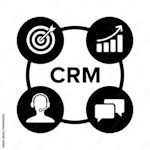
The cost of CRM software for small businesses can vary widely depending on several factors such as the size of the business, the features and functionality needed, the number of users, and whether the CRM is hosted on-premises or in the cloud. Here’s a breakdown of typical costs associated with CRM for small businesses:
1. Subscription-Based CRM Software
Most modern CRM solutions are offered on a subscription basis (Software-as-a-Service, SaaS), where businesses pay a monthly or annual fee per user. Pricing can range from:
- Basic Plans: Starting as low as $10 to $25 per user per month. These plans usually offer essential CRM features such as contact management, lead tracking, and basic reporting.
- Mid-Tier Plans: Typically priced between $25 to $75 per user per month. These plans often include additional features like sales pipeline management, customization options, integration capabilities with other software, and more advanced analytics.
- Enterprise Plans: Higher-end plans can range from $75 to $150 or more per user per month. These plans may include advanced customization, workflow automation, AI-driven insights, dedicated support, and comprehensive security features.
2. Additional Costs to Consider
Implementation Costs: Some CRM providers may charge an upfront fee for initial setup, data migration, and customization to fit your business needs. This cost can vary based on the complexity of your requirements.
- Training and Support: Training your team to use the CRM effectively may involve additional costs, especially for more complex systems or extensive customization.
- Add-Ons and Integrations: There might be additional costs for integrating the CRM with other business software (e.g., accounting software, marketing automation tools) or for purchasing add-on modules for specialized functionalities.
3. Free CRM Options
- Basic Free Plans: Some CRM providers offer free versions of their software with limited features, often suitable for very small businesses or startups looking to get started without upfront costs.
- Open-Source CRM: For businesses with technical expertise, open-source CRM solutions like SuiteCRM or SugarCRM are available at no initial cost, but may require significant customization and ongoing maintenance.
Factors Affecting Cost
- Number of Users: The more users you have, the higher the total cost of the CRM subscription.
- Feature Requirements: Advanced features such as AI-driven insights, advanced reporting, custom workflows, and API access typically come with higher-priced plans.
- Customization Needs: Tailoring the CRM to specific business processes and workflows may incur additional costs.
Choosing the Right CRM
When evaluating CRM options for your small business, consider not only the upfront costs but also the long-term benefits and return on investment (ROI). Look for a CRM that aligns with your business goals, offers scalability as your business grows, and provides adequate support and training for your team.
By carefully assessing your business needs and comparing CRM providers based on features, pricing, and support, you can choose a CRM solution that enhances efficiency, improves customer relationships, and contributes to the overall success of your small business.
